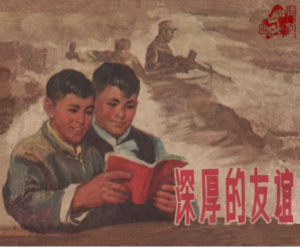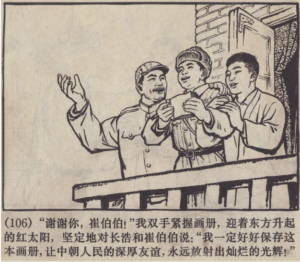By Hongli Zeng ‘24
In the past summer I traveled to Chengdu, China, my home, to conduct field research with funding from the Asian Studies Program’s Gaylord Prize for Independent Study Research. The project examines representations of the Korean War in lian huan hua (连环画), a particular form of Chinese comic books widely produced and circulated in socialist China. In close collaboration with Professor John Williams of the History Department and Asian Studies Program, I collected and translated these materials, which will also be used for teaching purposes at Colorado College.
Despite being one of the opening episodes of the global Cold War, The Korean War (1950-1954) remains a “forgotten war” in the United States, where its historical significance is often overshadowed by the more heated narrative of the American entanglement in Cuba and Vietnam. On the other hand, it was and still is remembered in China as the cornerstone of its nationhood, for it brought about the very critical geopolitical security of the newly born republic. Among the various literary and artistic forms circulating in the early decades of the nation, lian huan hua played a crucial role in shaping the depiction of the Korean War to Chinese readers. In my research, I attempted to explore the ways in which the Korean War was textually narrated, visually portrayed, and collectively remembered through lian huan hua, with a brief investigation into the origin and afterlife of lian huan hua in 20th century China.
My research involved compiling a list of lian huan hua on the Korean War and gathering secondary literature on relevant topics.I also conducted interviews with people who were or are actively involved with reading, collecting, and selling these comic books. Given their popularity for their capacity to evoke nostalgia among collectors in today’s China, I was able to connect with and talk to some collectors and business owners of lian huan hua.
Another highlight of the research was my trip to Shanghai located in eastern China. In this hotspot of China’s cultural, intellectual, and political activities for much of the 20th century, I talked to scholars specializing in the history of popular culture in Shanghai, and visited local archives and libraries, where I acquired many precious materials for my research.
One of the lian huan hua works I translated over the summer is A Profound Friendship (深厚的友谊), depicting the shared revolutionary cause of a Chinese and a Korean boy in Manchuria during Japanese occupation in the 1930s. Their profound transnational friendship developed under Japanese colonialism then brought them together again on the Korean battlefield in the early 1950s, but this time, positioning them against “American imperialism.”

Cover Illustration for A Profound Friendship (深厚的友谊) published in 1965 in Shanghai.

The picture above depicts the scene where, after years of seperation, two close friends finally reunited during combat. The caption reads:
I held the hand of a Korean People’s Army soldier dearly: “Thank you for your backup!” That soldier said in firm determination: “Chinese and Korean people are the comrade-in-arms going through life and death together. American imperialism is the common enemy of ours. Let us fight together and strike the American devils more fiercely!”

The caption on the concluding page reads:
“Thank you Uncle Cui!” I held the booklet in my tight hands. Facing the rising red sun in the east, I said to Changhao and Uncle Cui with determination: “I will take good care of this booklet and let Chinese-Korean people’s profound friendship radiate the glorious brilliance forever!”
Overall, my independent summer research funded by Asian Studies’ Gaylord Prize was a rewarding experience for my academic practice and intellectual growth. For those who are interested in looking more closely into materials like the ones above, may want to consider registering for the Block 7 class in the upcoming Spring semester:
“HY304 Advanced Topics in History: Print and Popular Culture in 20th Century East Asia” taught by Professor John Williams of the History Department and Asian Studies Program.